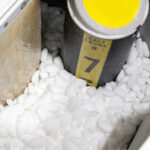 Water softeners are essential appliances that help remove minerals such as calcium and magnesium from hard water, providing numerous benefits to households. However, like any other appliance, water softeners have a finite lifespan. In this blog post, we will discuss the lifespan of water softeners, factors that affect it, and steps you can take to maximize their longevity.
Water softeners are essential appliances that help remove minerals such as calcium and magnesium from hard water, providing numerous benefits to households. However, like any other appliance, water softeners have a finite lifespan. In this blog post, we will discuss the lifespan of water softeners, factors that affect it, and steps you can take to maximize their longevity.
Understanding the Lifespan of a Water Softener:
The average lifespan of a water softener typically ranges between 10 to 15 years. However, this estimation can vary depending on several factors such as the quality of the water softener, the water hardness level, maintenance, and usage. It is essential to remember that these estimates are not fixed, and with proper care and maintenance, you can extend the lifespan of your water softener beyond the average range.
Factors that Affect the Lifespan of a Water Softener:
1. Water Quality and Hardness:
The mineral content and hardness level of your water can significantly impact the lifespan of your water softener. If your water has extremely high levels of minerals, the water softener will undergo more frequent regeneration cycles, placing more strain on its components. Over time, this increased workload can lead to reduced efficiency and a shorter lifespan for the water softener. Regular testing of your water’s mineral content and hardness level can help you gauge the demands placed on the system and take appropriate measures to maintain its longevity.
2. Maintenance:
Proper maintenance is crucial for the longevity of any appliance, and water softeners are no exception. Regular maintenance, such as inspecting the resin tank for any signs of damage, cleaning the brine tank, and replenishing the salt, is essential in ensuring the efficient operation of your water softener. Neglecting maintenance can lead to the accumulation of mineral deposits, decreased effectiveness, and overall wear and tear on the system, ultimately shortening its lifespan.
3. Usage:
The usage pattern of your water softener can also impact its lifespan. If your household has a high water consumption rate, the water softener will work harder and undergo more frequent regeneration cycles. On the other hand, a water softener that is used sparingly may experience stagnation and potential issues caused by lack of use. Striking a balance between consistent usage and not overtaxing the system is crucial to maximizing its lifespan.
Steps to Maximize the Lifespan of your Water Softener:
1. Regular Maintenance:
As mentioned earlier, regular maintenance is vital for the proper functioning and longevity of your water softener. Create a maintenance schedule that includes tasks such as inspecting and cleaning the resin tank, checking the controls and settings, and replenishing the salt as needed. Following the manufacturer’s guidelines and consulting a professional if necessary will ensure that you are taking the right steps to extend the lifespan of your water softener.
2. Water Testing and Adjustment:
Regularly testing your water’s mineral content and hardness level will help you gauge the demands placed on your water softener. If your water’s mineral content exceeds the system’s capacity, you may need to adjust or upgrade your water softener to ensure optimal performance and maximize its lifespan. Consulting water treatment professionals can provide valuable insights and recommendations based on your specific water quality.
3. Optimal Usage:
Using your water softener efficiently and in accordance with its capacity is essential to prolong its lifespan. Avoid overtaxing the system by not exceeding its recommended capacity and ensuring that the regeneration cycles are appropriately timed based on your water usage. Striking a balance between consistent and efficient usage will help you get the most out of your water softener.
Summary:
The lifespan of a water softener can vary depending on several factors, including water quality, maintenance, and usage. While the average lifespan ranges from 10 to 15 years, with proper care and regular maintenance, you can extend its longevity. Regular maintenance, water testing, and ensuring optimal usage are crucial in maximizing the lifespan of your water softener. By investing time and effort into these practices, you can enjoy the benefits of soft water for many years to come.

